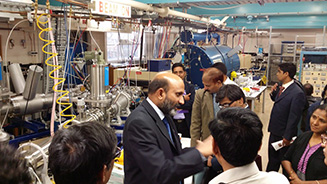17 January 2014
From 14-18 October 2013, 16 scientists from India travelled to Australia to experience science in Australia first hand. During the visit delegates met with representatives from government agencies and universities, and toured key scientific infrastructure in Sydney, Canberra and Melbourne.
The visit took place as part of a programme with the Indian Department of Science and Technology (DST), which sends two groups of scientists overseas each year to expose them to the work of overseas institutions. This year Australia was selected as one of the destinations.
The delegation led by Joint Secretary of DST, Dr Inder Jit Singh, toured facilities including the Australian OPAL research reactor at Lucas Heights, the Heavy-ion Accelerator Facility at the Australian National University, the CSIRO laboratories at Clayton and the Australian Synchrotron. They met scientists from relevant fields at the University of New South Wales, Australian Academy of Science, Geoscience Australia, National ICT Australia, University of Melbourne and Swinburne University and participated in a roundtable with Australian Government officials.
Australia and India share a strong bilateral science relationship, which has been underpinned by the Australia India Strategic Research Fund (AISRF). The delegation provided an opportunity for both countries to build on, and expand the scope, of the bilateral science relationship – an important step as both countries seek to address common scientific challenges in food and water security, environmental sustainability, energy security, and health and wellbeing.
The delegation returned to India with a greatly enhanced understanding of Australia. Many of the delegates are planning to contact the people they met during the trip to begin exploring practical options for collaboration at an institutional level.
The visit was also useful for Australian researchers and institutions that took the opportunity to showcase the quality of Australian science infrastructure to potential partners and gained a better understanding of India.

Professor Chennupati Jagadish conducts a tour of the ANU Heavy-ion Accelerator Facility with the delegation.